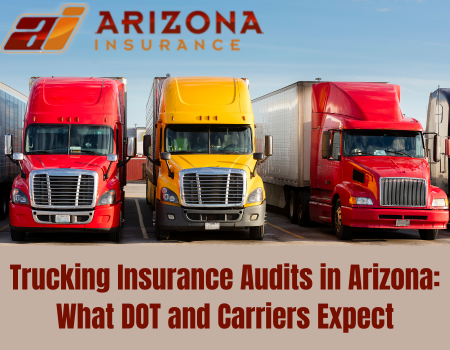Running a trucking business in Arizona means navigating more than long highways and delivery deadlines, such as trucking insurance. One of the biggest challenges carriers face is insurance audits—a requirement that often leaves business owners feeling stressed and unprepared. Whether you’re an owner-operator with a single truck or managing a fleet across Mohave County, Phoenix, or Tucson, understanding what the Department of Transportation (DOT) and your insurance carrier expect can save you money, time, and unnecessary headaches.
In this article, we’ll break down how trucking insurance audits work in Arizona, what triggers them, and the most important records to keep so you pass without financial surprises.
Why Trucking Insurance Audits Happen
 Insurance audits are not about “catching” you—they’re about making sure your policy matches your actual risk exposure.When you first purchase a trucking insurance policy, the premium is based on estimates: projected mileage, driver count, gross revenue, or payroll.
Insurance audits are not about “catching” you—they’re about making sure your policy matches your actual risk exposure.When you first purchase a trucking insurance policy, the premium is based on estimates: projected mileage, driver count, gross revenue, or payroll.
If your actual operations differ from those estimates, your insurance company will adjust your premium during the audit. This protects both you and the insurer. For example:
- If you underestimated your mileage, you might owe additional premium.
- If your business slowed down and you ran fewer miles, you could get money back.
On top of this, the DOT requires carriers to maintain active, accurate coverage to stay compliant. Audits ensure that the data your insurer has lines up with the reality of your trucking operations.
What Insurance Carriers Expect
In Arizona, carriers typically focus on three core areas during an insurance audit:
1. Mileage Records
Insurance companies want an accurate count of how many miles your trucks traveled during the policy period. This helps them verify whether you stayed within the mileage bands your premium was based on. Electronic Logging Devices (ELDs), trip sheets, or International Fuel Tax Agreement (IFTA) reports are usually acceptable.
2. Revenue Documentation
Some policies are rated on gross receipts instead of mileage. In this case, you’ll need to provide profit and loss statements, tax filings, or invoices that show how much revenue your trucking business generated.
3. Driver and Payroll Records
If you employ multiple drivers, carriers will ask for details like W-2s, 1099s, or contractor agreements. They want to confirm how many drivers were covered under your policy and whether any subcontractors had their own insurance.
What DOT Expects During Compliance Reviews
The Arizona DOT and Federal Motor Carrier Safety Administration (FMCSA) audits overlap with insurance audits in some areas, but the focus is slightly different. DOT officials want to make sure your business is operating safely and legally. They will often request:
- Insurance Certificates: Proof that your policy meets federal and state minimum requirements.
- Accident and Safety Records: Logs showing how you handle incidents, driver qualifications, and vehicle inspections.
- Hours-of-Service Compliance: ELD data proving your drivers didn’t exceed legal driving limits.
Failing a DOT audit can lead to fines, penalties, or even being shut down. Having your trucking insurance records properly aligned can prevent red flags from appearing during these reviews.
Common Mistakes Arizona Truckers Make in Audits
- Mixing Personal and Business Mileage – Some owner-operators use their truck for personal use and don’t separate miles correctly, leading to higher premiums.
- Not Reporting Leased or Subcontracted Drivers – Leaving out contractors who drive under your authority can create compliance issues.
- Waiting Until the Last Minute – Scrambling for paperwork often results in incomplete records and mistakes that cost money.
- Ignoring IFTA Reports – Since IFTA filings already document your mileage and fuel use, not submitting them during an audit raises red flags.
How to Prepare for a Smooth Audit
- Organize Records Year-Round: Keep trip logs, fuel receipts, and payroll documents in one place instead of rushing at audit time.
- Leverage Digital Tools: ELDs and accounting software can make pulling reports much easier.
- Communicate With Your Agent: If your mileage or business changes mid-year, update your insurance broker to avoid huge adjustments later.
- Verify Subcontractors’ Coverage: Always collect Certificates of Insurance (COIs) from any drivers working under your authority.
For Arizona trucking companies, trucking insurance audits are unavoidable—but they don’t have to be overwhelming. Both your insurance carrier and the DOT are looking for the same thing: accurate, verifiable data that reflects your actual operations. By keeping clear records of mileage, revenue, and driver information, you can avoid costly surprises and even secure refunds when your activity is lower than expected.
The road may be unpredictable, but your audits don’t have to be. With preparation and the right documentation, trucking businesses across Arizona can stay compliant, reduce risk, and keep their focus where it belongs—on moving freight safely and profitably.
